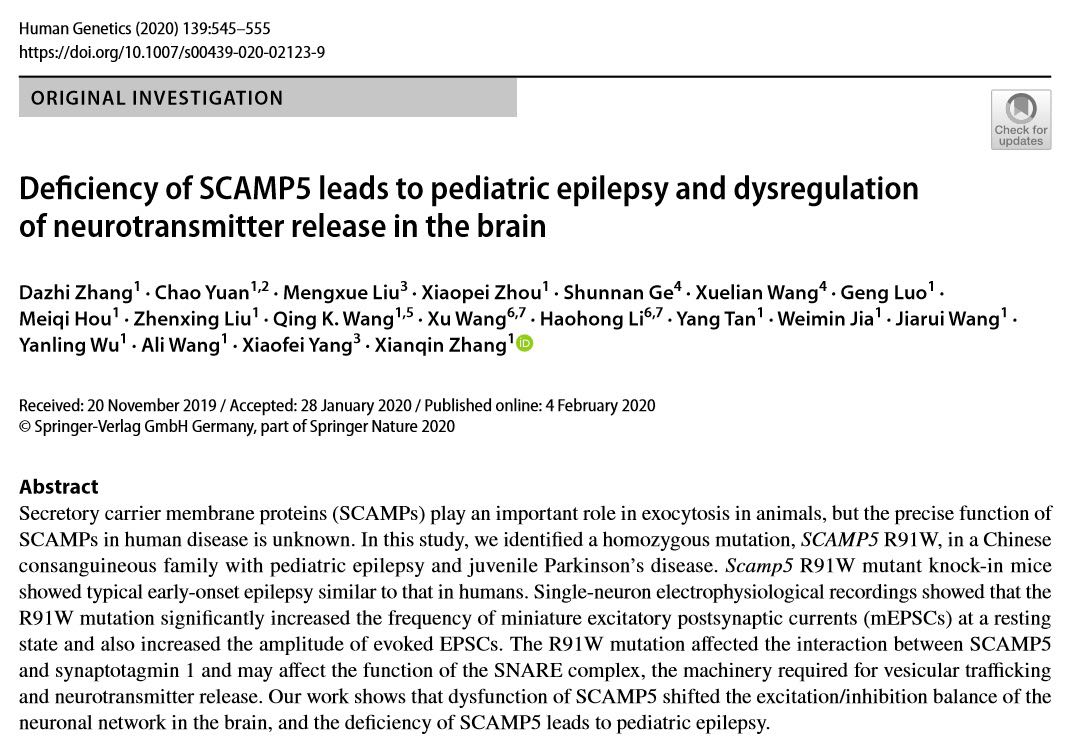(Correspondent Zhang Dazhi, Chen Jun) In April 2020, Professor Zhang Xianqin's team from College of Life Science & Technology, Huazhong University of Science and Technology, published an article on Human Genetics, one top journal in the field of Genetics. The research paper entitled: “Deficiency of SCAMP5 leads to pediatric epilepsy and dysregulation of neurotransmitter release in the brain”.

Epilepsy is a common neurological disease characterized by recurrent seizures, seizures are characterized by sudden, recurrent, and transient dysfunction in central nervous system and resulting from abnormal firing of neurons in the brain. Because of the different parts and degree of the brain involved in the seizures, dysfunction can be manifested as disturbance of movement, feeling, consciousness, behavior, autonomic nerve function or other different disorders. Epidemiological investigation shows that, there are about 50 million people with epilepsy in the world, with 2 million new cases each year, about 50% of patients develop disease in children and adolescents. Pediatric epilepsy can affect neurogenesis, neuronal circuity, and network activity, as well as the development of the brain.
In this study, the researchers studied a pediatric epilepsy family, and identified SCAMP5 as a novel disease gene in the family. SCAMP5 is a member of the secreted carrier membrane protein family (SCAMPs), secretory carrier membrane proteins (SCAMPs) play an important role in exocytosis in animals, but the relationship between SCAMPs and human disease is unknown.
Scamp5 knock-in mice showed typical early-onset epilepsy similar to that in humans. Single neuron electrophysiological recordings showed that the mutation significantly increased the frequency of miniature excitatory postsynaptic currents (mEPSCs) at a resting state and also increased the amplitude of evoked EPSCs. SCAMP5 is identified as an important negative regulator of excitatory synaptic neurotransmitter secretion in the brain. The deficiency of SCAMP5 enhance the frequency of neurotransmitters released from excitatory synapses in the brain, the mutation of SCAMP5 selectively enhances the transmission of excitatory synapses, upsetting the balance between excitation and inhibition of the brain's neural networks, and causes abnormal firing of neurons in the brain, which can lead to pediatric epilepsy. These results suggest that SCAMP5 is a potentially important inhibitor of excitatory synaptic signal transduction and a regulator of the balance of excitation and inhibition of the whole neuronal network in the brains of human and other mammals. SCAMP5 has a broad impact on neurotransmitter release in the brain. SCAMP5 is a potential drug target for the prevention of brain neuronal hyperexcitation, and the results provide a novel mechanism for seizures and a novel mechanism for pediatric epilepsy.
Professor Zhang Xianqin from College of Life Science & Technology, Huazhong University of science and technology is the corresponding author of the paper. The co-first authors of the publication are PhD candidate Zhang Dazhi from Huazhong University of science and technology, Dr. Yuan Chao, PhD graduate of Huazhong University of science and technology and Liu Mengxue master from South-Central University for Nationalities. Professor Wang Xuelian, from Tangdu Hospital of Fourth Military Medical University, Professor Yang Xiaofei from school of biomedical engineering, South-Central University for Nationalities, and professor Li Haohong from Wuhan National Research Center of Optoelectronics, Huazhong University of Science and Technology, participated in this work. This work is supported by grants from the National Natural Science Foundation of China and supported by Program for HUST Academic Frontier Youth Team.
Up to now, more than 7000 kinds of diseases have been founded to be associated with mutations in human genes. Genetic research in diseases would be helpful to understand the causes, mechanism and diagnosis of diseases, and provide important theoretical basis and application for treatment of diseases. Many achievements in the field have been successfully applied to the accurate treatment, diagnosis and drug development of diseases.
Professor Zhang Xianqin's team focus on the genetic research of major human diseases such as nervous system diseases. At present, they have collaborated with physicians and scientists from third Xiangya Hospital, Central South University, Tangdu hospital and xijing hospital of Fourth Military Medical University, Tongji hospital of Tongji Medical College of Huazhong University of Science and Technology, Rockefeller University in the United States, National Research Center of France and other famous institutions. Professor Zhang Xianqin has published a number of original research results in international top journals such as Nature, Cell, Nature genetics and Human genetics. In 2015, Professor Zhang published a research paper in Nature which was rated as the 100 most influential international academic papers in China in 2015, this paper is selected to ESI hot paper and highly cited paper, and the research results were rated as the top ten scientific progress of Huazhong University of Science and Technology in 2015. In addition, Professor Zhang Xianqin has won young geneticist award of hubei province in 2018 and other academic awards.
